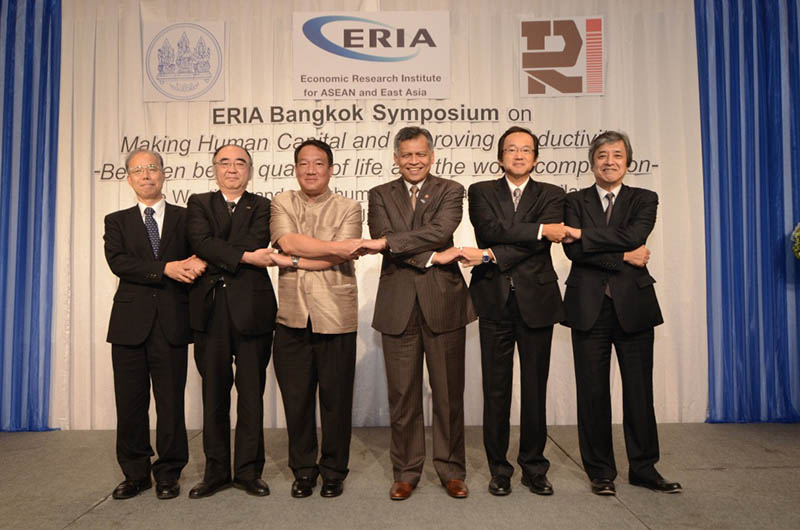ERIA Bangkok Symposium on Making Human Capital and Improving Productivity
Date:
27 July 2012Share Article:
Print Article:
Bangkok, July 27, 2012--Economic Research Institute for ASEAN and East Asia (ERIA) organized the symposium entitled "Making Human Capital and Improving Productivity: Between better quality of life and the world competition" on 27 July 2012 in Bangkok, Thailand
It was in cooperation with The Embassy of Japan in Thailand, Bangkok Research Center (BRC-JETRO Bangkok), Japan International Cooperation Agency (JICA), Thailand Office, National Economic and Social Development Board (NESDB), and Thailand Development Research Institute (TDRI).
There are 100 participants attended the symposium, which ranging from Thai government officials, ASEAN Secretariat, research institutions across ASEAN, academic institutions, private sector, and other international organizations.
The main objective of the symposium is to explore venues for the uninterrupted expansion of middle-income class in the region. It is aimed at facilitating knowledge transfer, sharing of information, and improving the understanding of various stakeholders on how to reach a better quality of human capital to enhance the region's economic productivity. The symposium also discussed how to strengthen momentum for high economic growth, while ensuring sustainability and inclusiveness by moving forward from resources-abundant-led growth to human-capital-led development strategy.
The symposium was opened by the speech from H.E. Mr. Masato Otaka, Economic Minister, Embassy of Japan in Thailand. Mr. Otaka pointed out the effort to fostering the middle-income class that is important due to the speed of aging population and the labor income share issue, particularly in Thailand. He also highlighted that this symposium would serve as a forum for sharing of the policy experience on human capital development and productivity.
The symposium was honored with two keynote speakers. The first keynote speaker, H.E. Mr. Kittiratt Na Ranong, Deputy prime Minister and Minister of Finance, Thailand, emphasized that policy to improve economic growth must be embedded also with proper redistribution policy to have a better protection for workers and attain higher productivity. H.E. Mr. Na Ranong stated that this symposium was a venue to exchange ideas and explore opportunities and useful recommendations for policy makers. H.E. Mr. Na Ranong held high expectations that the results from symposium can provide inputs for further cooperation within ASEAN and with other partners.
The second keynote speech was delivered by H.E. Dr. Surin Pitsuwan, Secretary-General of ASEAN. He emphasized that this symposium reflects efforts to sustain the momentum of economic growth, not only environmentally and physically sustainable but also socially and politically sustainable. ASEAN and East Asia region is in the center of world's growth with East Asia integration as the new growth model. In order to get the maximum benefit from the integration, ASEAN and East Asia region must ensure the inclusiveness and equitability of development within themselves in order to maintain social stability. H.E. Dr. Pitsuwan highlighted that we need to guarantee, protect, and build our people's confidence in the region, so that the economic development will truly bear fruits.
The symposium had two separated panel discussions: (1) international productivity and macroeconomy; and (2) the social policy for the disadvantaged workforce. The first panel focused on macroeconomic policy, productivity, competitiveness, and innovation in ASEAN and East Asia. The second panel discussed social policy for disadvantaged workers as well as for the aged population in the region.
The first panel discussion drawed on three main conclusions concerning productivity enhancement and macroeconomic policy. First, there has been low productivity and stagnance in Total Factor Productivity (TFP) in some ASEAN countries, although innovation has been taken place in the region, at least for several globally competitive products (e.g. electrical equipment). Second, there is a need to reorient growth strategy and explore more strategies to increase the TFP and human capital quality in order for countries to move up from middle-income to high-income economies. It can be achieved by investing more in human capital and R&D. Third; there is a need to design a comprehensive solution to achieve the AEC objectives by integrating the technological cooperation and human resource development through better public and private partnerships (PPP).
The second panel discussion focused on social policy for the disadvantaged workers, including how to cope with rapid ageing in Asia. The panel emphasized that in the current global economic crisis, every worker (including professionals) is vulnerable or disadvantaged. The panel proposed several avenues for extending the current coverage of pension and other social protection programs. More comprehensive discussions are needed on how to create a social security system for the aged without endangering the fiscal balance of ASEAN countries.
The symposium concluded with a closing remark from Prof. Hidetoshi Nishimura, Executive Director of ERIA. Prof. Nishimura emphasized that in order for ASEAN and East Asia to be the engine of the world growth, especially ASEAN middle-income countries to move up to higher status, it is vital to put the highest priority on human capital development and institutional and regulatory reforms. These policies will make the region more competitive and productive. At the same time, it is also crucial to think about social policy - uniquely Asia and innovative - in the development strategy to support economic growth and maintain social harmony.








